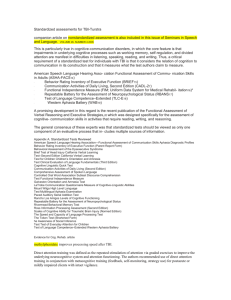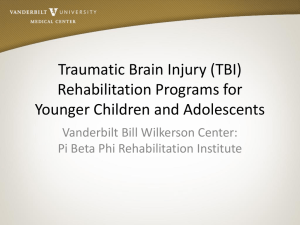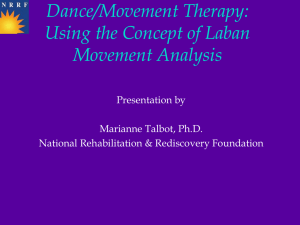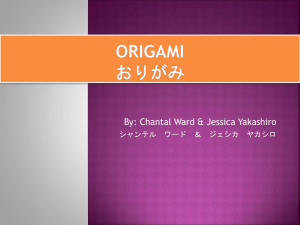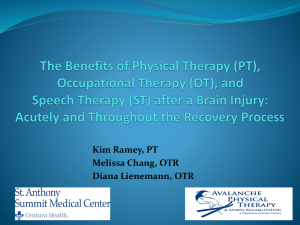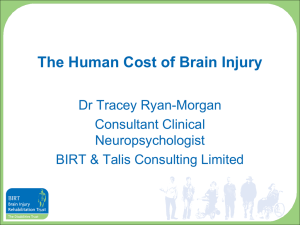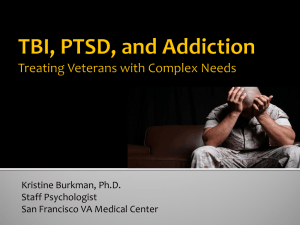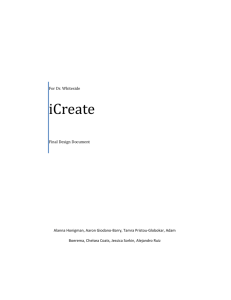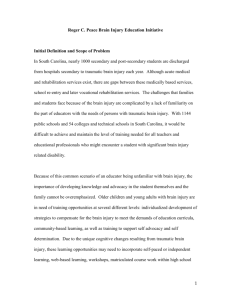Rebecca Callahan, CTRS, CBIS Certified Therapeutic Recreation
advertisement
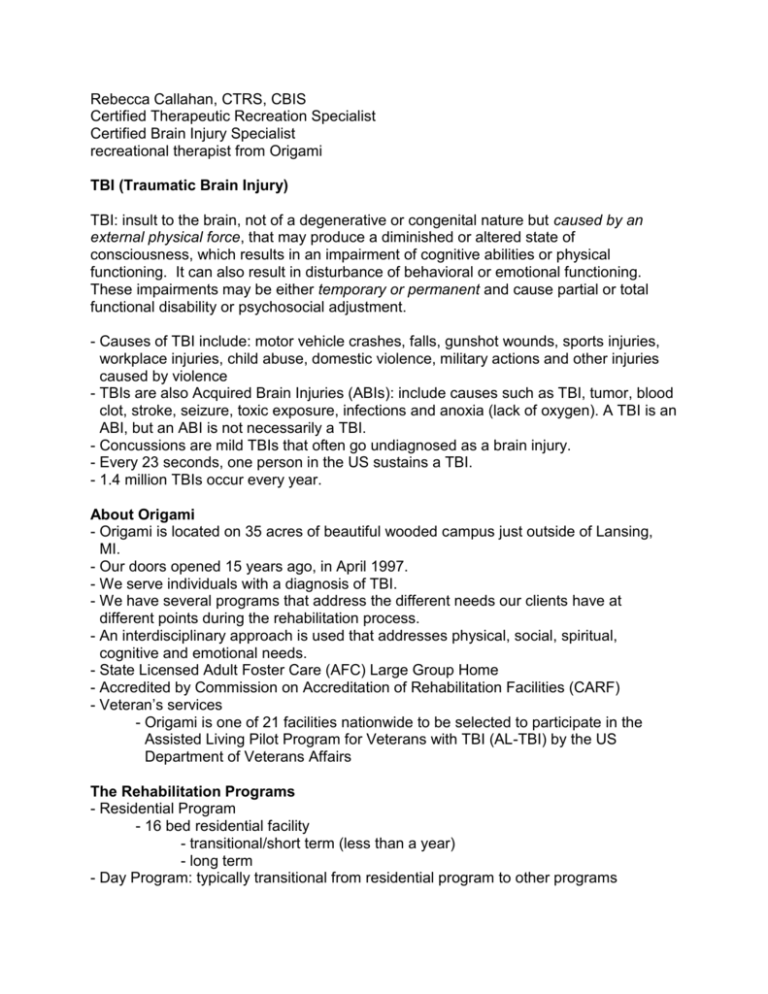
Rebecca Callahan, CTRS, CBIS Certified Therapeutic Recreation Specialist Certified Brain Injury Specialist recreational therapist from Origami TBI (Traumatic Brain Injury) TBI: insult to the brain, not of a degenerative or congenital nature but caused by an external physical force, that may produce a diminished or altered state of consciousness, which results in an impairment of cognitive abilities or physical functioning. It can also result in disturbance of behavioral or emotional functioning. These impairments may be either temporary or permanent and cause partial or total functional disability or psychosocial adjustment. - Causes of TBI include: motor vehicle crashes, falls, gunshot wounds, sports injuries, workplace injuries, child abuse, domestic violence, military actions and other injuries caused by violence - TBIs are also Acquired Brain Injuries (ABIs): include causes such as TBI, tumor, blood clot, stroke, seizure, toxic exposure, infections and anoxia (lack of oxygen). A TBI is an ABI, but an ABI is not necessarily a TBI. - Concussions are mild TBIs that often go undiagnosed as a brain injury. - Every 23 seconds, one person in the US sustains a TBI. - 1.4 million TBIs occur every year. About Origami - Origami is located on 35 acres of beautiful wooded campus just outside of Lansing, MI. - Our doors opened 15 years ago, in April 1997. - We serve individuals with a diagnosis of TBI. - We have several programs that address the different needs our clients have at different points during the rehabilitation process. - An interdisciplinary approach is used that addresses physical, social, spiritual, cognitive and emotional needs. - State Licensed Adult Foster Care (AFC) Large Group Home - Accredited by Commission on Accreditation of Rehabilitation Facilities (CARF) - Veteran’s services - Origami is one of 21 facilities nationwide to be selected to participate in the Assisted Living Pilot Program for Veterans with TBI (AL-TBI) by the US Department of Veterans Affairs The Rehabilitation Programs - Residential Program - 16 bed residential facility - transitional/short term (less than a year) - long term - Day Program: typically transitional from residential program to other programs - Community Based Program - Semi-Independent Living - 6 individual apartments on site - community integration - Outpatient program Services and Disciplines - attending physicians - neuro-psychiatrists - psychologists - social workers - care coordinators - licensed nurses - occupational therapists - speech language pathologists - physical therapists - dietitians - recreational therapist - art therapist - vocational services specialist - rehabilitation aides (job specialists, for example) - patient care technicians (med. passers, basic first aid...nurse oversees them) - living skills staff - therapy dogs: both personal dogs from home and provided by staff Specialized Services - Cognitive Perceptual Motor Retraining (CPM): focuses on retraining the visualperceptual, tactile-kinesthetic, motor, and cognitive skills affected by trauma - Pre-Driving Services: OTs are trained to thoroughly assess the skills necessary to safely return to driving following a TBI. Origami’s pre-driving services evaluation and training occur in a simulated driving environment in addition to the traditional clinical setting, utilizing an electric car on paved trails. - Manual Therapy: PTs use a hands-on treatment method for muscles, tendons, ligaments, nerves and joints. The goal for using these skilled hand movements is to increase range of motion, induce relaxation, decrease pain, and redue soft tissue swelling. - Vestibular Rehabilitation: for clients who experience dizziness, poor balance, low activity level, and vision difficulty. PTs have received additional training for this individualized, comprehensive vestibular evaluation. The PT will assess strength, range of motion, balance, ambulation, sensation and occulomotor tests to assess the vision and vestibular systems. - Vision Therapy: every client referred to Occupational Therapy at Origami will receive a vision screen. If physical, cognitive or perceptual vision complications are identified, the therapist will work closely with the client and an Optometrist who will develop a treatment plan and exercise regimen. Recreational Therapy at Origami - Certified Therapeutic Recreation Specialist (CTRS) - Therapy Groups and Leisure opportunities - art therapy, woodworking, creative memories, town hall, adapted yoga, culinary delights, aquatic therapy, scheduling group, newsletter group, community outings, individual sessions, music therapy, hippotherapy (horseback riding therapy), provide resources (games, reading material, music, movies, etc.) Hierarchy of Cognitive Functions From base to top of triangle, as awareness and compensation increase: Neurofatigue -- Adynamia/Disinhibition -- Attention/Concentration -- Information Processing -- Memory -- Executive Functioning - Neurofatigue: fatigue that is organically based and NOT due to excessive activity or abnormal sleep patterns. It can emerge suddenly without warning, especially after engaging in a cognitively demanding task. - Adynamia/Disinhibition: - adynamia: low mental energy or apparent lack of will. Not “dynamic.” - disinhibition: a syndrome marked by difficulty properly directing and controlling energy and emotions. - Attention/Concentration: staying awake, alert and ready, focusing and keeping a train of thought. - Information Processing: taking environmental stimulation in through the five senses, interpreting it, and responding to it. - Memory: taking in new information, holding on to information, and recalling information when needed. - Executive Function: the ability to reason, plan, problem solve, make inferences and/or evaluate results of actions and decisions. Glasgow Coma Scale - a measure of brain injury severity - scores range from 3 to 15 - the lower the score, the more severe the brain injury - Mild Brain Injury - GCS score 13-15 - loss of consciousness less than 30 minutes (possibly no loss of consciousness) - Moderate Brain Injury - GCS score 9-12 - coma, more than 20-30 minutes, but less than 24 hours - Severe Brain Injury - GCS score 3-8 - coma lasting longer than 24 hours, often lasting days or weeks Ranchos Los Amigos Scale - The Ranchos Los Amigos Scale rates cognitive functioning and expected behaviors through an assessment of levels 1-10 - A scale used to describe and communicate the patient’s level of functioning - the lower the score, the lower the patient is functioning.
